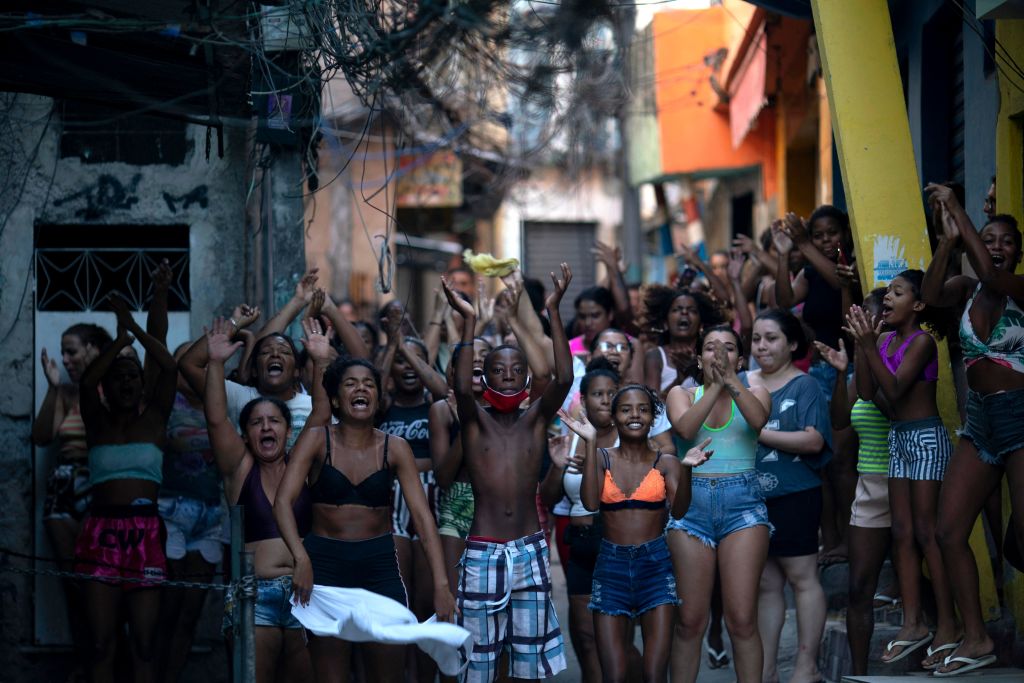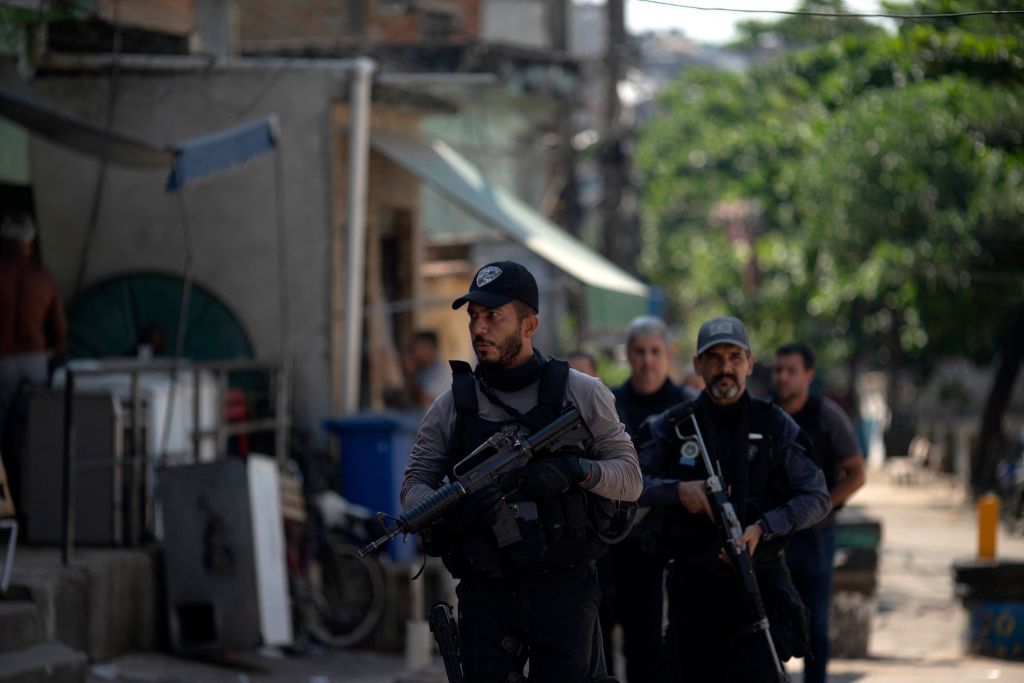
When Jair Bolsonaro successfully campaigned for the Brazilian presidency in 2018, one of his central promises was to unleash the police in the favelas (slums) which are home to most of the nation’s poor and largely Black citizens. The long-time far-right Congressman, on the campaign trail, vowed greater violence in the name of fighting drug gangs and promised to provide even stronger legal immunities to police officers who kill innocents.
On Thursday, in Rio de Janeiro, Brazilians once again witnessed the horrific and savage consequences of that approach, one that strongly echoes that of Filipino strongman Rogerio Duterte. Duterte has become globally notorious (and domestically popular) for championing extra-judicial police slaughter that kills drug dealers and law-abiding, working-class residents alike. Bolsonaro, an admirer of authoritarianism wherever it emerges, has for years been eager to import that model to Brazil.
In Jacarezinho—one of Rio’s largest favelas where I grew up and my family still lives—police entered at dawn on May 6 with the stated goal of arresting drug traffickers. The invading force resembled more an army at war than a conventional police operation. They used armored helicopters, tank-like vehicles, and around two hundred heavily armed officers.
By the time they left nine hours later, at least twenty-nine people were dead. One of the dead was a police officer, the rest lived in the favela. Bolsonaro’s Vice President, Gen. Hamilton Mourão, immediately claimed, without presenting any evidence, that all the dead were “gang members.”
It was the deadliest police operation in the city’s history. Two people riding a nearby subway were wounded by stray bullets. Many of Jacarezinho’s 40,000 residents spent the day locked in their homes utterly terrorized by police forces claiming to bring security to their lives as they invaded a home of a family unrelated to the drug trade, and shot in front of their 9-year-old daughter an unarmed man who had fled into the house.
I spent hours desperately trying to speak with my mother, siblings and close friends by WhatsApp and Telegram throughout the day to make sure they were safe as they laid on the ground or under beds to avoid stray bullets. The videos that emerged, taken by courageous residents, are too harrowing to watch, showing summary executions of already surrendered, apprehended or wounded suspects, along with indiscriminate shooting.
Though never before as lethal in terms of body count, such police massacres are common in Brazil, and the scripts each side hauls out in the immediate aftermath are always the same. Bolsonaro’s supporters instantly proclaim that all of the dead are “criminals” even though none of their identities is publicly known. Meanwhile, some well-intentioned academics and “crime experts” who have rarely stepped foot in a favela let alone lived in one reflexively impose a simplistic framework which whitewashes the complex problems of violent crime that do plague the lives of the favela’s poverty-stricken residents.
Sloganeering is tempting in the face of so much human carnage, but ultimately serves little purpose for the people whose lives are most affected. Drug gangs are real, heavily armed, and shoot at police forces when they enter. With little to no support from the government in the way of social services, adolescents and even pre-adolescents are vulnerable to recruitment by drug gangs as their only way out of hopeless poverty and misery—and often as a matter of protecting their own lives. With favelas all but abandoned by the state, some leaders of these drug gangs rule over the favelas as dictators, sometimes benevolent as when they have enforced COVID-19 lockdowns when Bolsonaro refused to and provide aid to residents in need of medical care, but others rule as totalitarians, relying on arbitrary violence and intimidation.
It does not help favela residents for outsiders to deny the reality of these problems. Those of us who grew up there and whose identities are forever shaped by them understand that far more than abstract moralizing is needed. I have worked in Congress to increase the resources available for police intelligence, to avoid indiscriminate shooting and enable them to locate those whose arrests courts have authorized, as well as to provide mental health counseling to police officers to prevent instability and root out the malicious and psychopathic from the police forces. What is needed is not a general and blunt crusade against the police but reforms and resources to professionalize these forces, while demanding real accountability to those who abuse their power.
But one complicating fact hovers over all of this. For decades in Brazil, discussions of crime focused on drug gangs. The poor and primarily Black faces of the favela made for powerful villain images in media narratives. But the reality of Brazilian crime is much different.

By far the most barbaric and powerful crime gangs are not based in favelas but instead are the country’s terrifying para-military factions, composed largely of white and middle-class current and former police officers and military agents. These militias, explicitly praised just a few years ago by Bolsonaro as noble vigilantes, now control more territory in Rio than the favela gangs and have broken into the drug trade. They are more ruthless, executing anyone they suspect of working with police or who resists their extortion demands and assertions of absolute power.
Some criminal analysts say there is “an accommodation [between the police and] the militias, including because many of the [militia members] are police or former police or firefighters.” They speculate that some police actions against these favela gangs may be motivated not by a desire to arrest criminals but rather to clear them out so that militias can take over. This concern has heightened greatly with mounting evidence of Bolsonaro’s family’s ties to Rio’s para-military gangs.
Several scandals, particularly the ongoing investigation into the devastating 2018 assassination of my close friend and party comrade, Rio City Councilwoman Marielle Franco, have revealed numerous ties between Bolsonaro, his family, and these militias who murdered Marielle. Just days before the police operation in Jacarezinho, Bolsonaro met with the newly installed far-right Governor of Rio state, Claudio Castro (his predecessor was just impeached on corruption charges).
There is no evidence that Bolsonaro encouraged this specific police operation, but the carnage is a perfect manifestation of the crime policies Bolsonaro has long sought.
Whatever else is true, Brazil can no longer tolerate senseless mass killings of the kind brought to Jacarezinho this past week. Each time it happens, the police realize they can kill whoever they want with few consequences, emboldening them further, while life does not improve for the people they claim to be helping. Police massacres are immoral and criminal, and the complexities of Brazil’s crime problems cannot be invoked to alter that basic truth.
More Must-Reads from TIME
- Cybersecurity Experts Are Sounding the Alarm on DOGE
- Meet the 2025 Women of the Year
- The Harsh Truth About Disability Inclusion
- Why Do More Young Adults Have Cancer?
- Colman Domingo Leads With Radical Love
- How to Get Better at Doing Things Alone
- Michelle Zauner Stares Down the Darkness
Contact us at letters@time.com